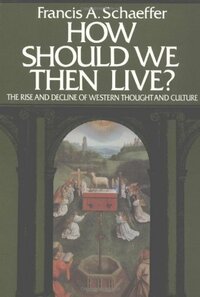You need to sign in or sign up before continuing.
Take a photo of a barcode or cover
48 reviews for:
How Should We Then Live? The Rise and Decline of Western Thought and Culture
Francis A. Schaeffer
48 reviews for:
How Should We Then Live? The Rise and Decline of Western Thought and Culture
Francis A. Schaeffer
This is at least the fifth time I’ve read this book in the last 25 years. The older it gets the more relevant it becomes. Especially the last couple of chapters, which speak to the downfall of western civilization as it is taking place today.
informative
reflective
medium-paced
"As a man thinketh, so is he." An adequate overview of Western history and philosophy, Roman era to the 1970s. This is written from a Christian perspective, and stresses the necessity of an infinite, personal God as a foundation upon which to build your worldview.
Schaeffer repeatedly qualifies his arguments by stating that one need not be a Christian or of Christian philosophy to be creative, or capable of reason, but he points out the stability and value in creative works, political systems, and scientific research when going on the assumption that there is order in our universe, and absolutes against which to judge our world.
And now I am enlightened as to why I LOATHE absurdist theatre. My entire core philosophy is rebelling against the message that life has no meaning except that which you assign to it.
Schaeffer repeatedly qualifies his arguments by stating that one need not be a Christian or of Christian philosophy to be creative, or capable of reason, but he points out the stability and value in creative works, political systems, and scientific research when going on the assumption that there is order in our universe, and absolutes against which to judge our world.
And now I am enlightened as to why I LOATHE absurdist theatre. My entire core philosophy is rebelling against the message that life has no meaning except that which you assign to it.
In this book, Francis Schaeffer traces Western thought and culture from ancient Rome to his present time (it was written in 1976), focusing on key moments and figures in the realms of philosophy, art, literature, science, theology, music, and film; brilliantly connecting each movement to the next. Throughout, he makes a compelling case for the truth of the Christian worldview, explaining how it has affected and been reacted to in the last 2000 years of history. Schaeffer packs an incredible depth of information into a surprisingly engaging and accessible book, and I wholeheartedly recommend it to everyone, regardless of beliefs.
Was raised with this on the bookshelf, and had to read it for various classes. The history is usually twisted, if not downright wrong. The interpretation of art is flawed, to be extremely polite. It is interesting from the standpoint of it being a classic example of the human ability to twist any data or information to fit a preconceived notion.
Schaeffer traces the history of Western philosophy, art, and theology from the Roman Empire to the 1970s when he wrote this book. I agree with much of his analysis, and he's proved prescient in some ways (e.g. he foresaw the current debate over euthanasia). Yet at times his analysis is so broad that it at best lacks nuance and at worst misrepresents certain ideas. The book is structured chronologically, and I think he does a better job with the 20th century thinkers; consequently, I liked the last half of the book much better. Overall good but doesn't have the scholarly rigor I had hoped or expected.
challenging
hopeful
informative
slow-paced
Its amazing how a book concerning the cultural state of our world written in the 70s seems just a relevant today.
Schaeffer was fundamental to my thinking as a teenager. It's interesting to come back to this book as an adult. The narrative is still compelling. It's simplicity reminds me why I liked it so much growing up. Schaeffer's analysis of art, science, philosophy, etc.... is a very different story.



